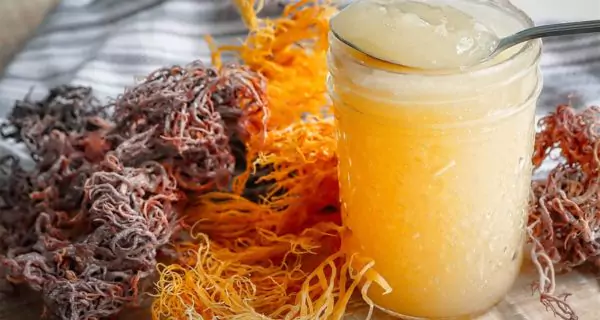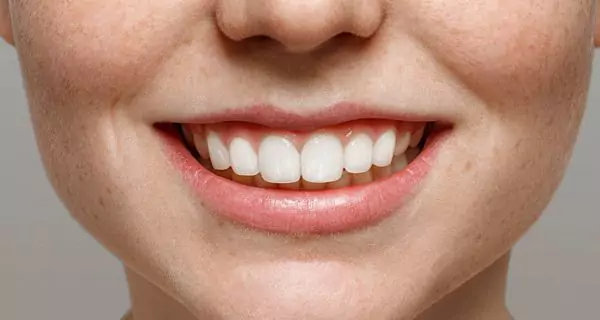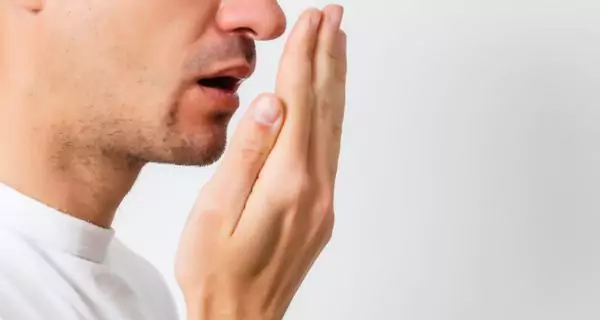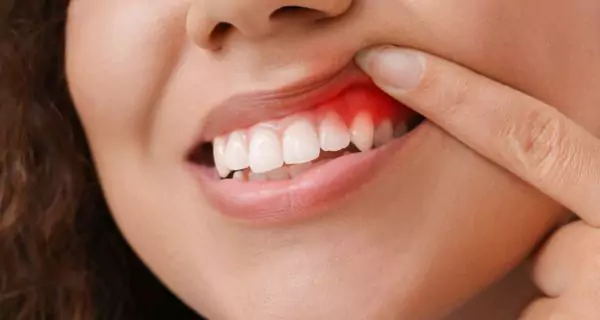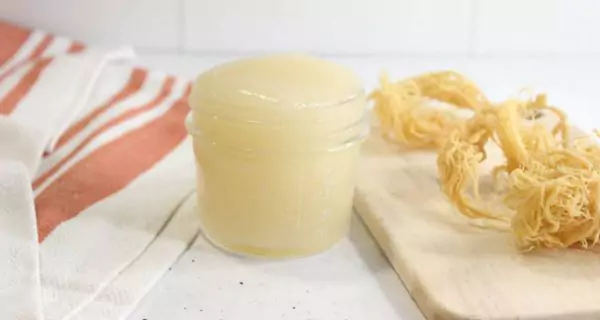Last Updated on: 19th September 2025, 12:29 pm
Also called Irish moss, sea moss is rich in calcium, magnesium, and other minerals that may make teeth stronger, reduce gum inflammation, and support healing after dental treatments. Sea moss can help your smile, but it should never replace brushing, flossing, and dental checkups.
Sea moss has been used for centuries in Ireland and the Caribbean, mostly as a thickener in soups and desserts. In addition, people valued it as a natural food full of minerals and energy.
In recent years, sea moss has become very popular on social media, especially TikTok and Instagram. It is often promoted as a “superfood” that may help the skin, digestion, immune system, and even dental health.
But can sea moss really help teeth and gums? In this article, we will explore the potential benefits, risks, and best ways to use sea moss for oral health.
What is sea moss?
Sea moss (Chondrus crispus) is a red algae that grows on the rocky coasts of the Atlantic Ocean, Europe, and the Caribbean. Its high content of essential minerals has made it a superfood that’s good for oral and general health.
It is low in calories, fat, and sugar, but rich in vitamins, minerals, antioxidants, and a small amount of plant protein, making it a versatile vegan food.
What nutrients are in sea moss?
Sea moss contains many nutrients important for general and dental health:
- Calcium: strengthens teeth and bones
- Magnesium: helps form enamel
- Phosphorus: works with calcium to protect teeth and jawbone
- Zinc: helps control harmful bacteria in the mouth
- Iodine: supports thyroid health (too much can be harmful)
- Potassium and Sodium: help balance fluids and support muscles
- Vitamin B2 (riboflavin): supports energy production and cell repair
- Antioxidants: reduce gum inflammation
- Fluoride: strengthens enamel and helps prevent cavities
Sea moss also contains carbohydrates, small amounts of protein and fat, and is about 80% water.
It is a useful supplement for people with mineral or vitamin deficiencies and can help maintain strong teeth and bones as the body ages.
How can sea moss benefit your dental health?
As noted, sea moss provides minerals essential for the whole body, and dental health is included. Let’s see the primary benefits.
Can sea moss strengthen teeth and the jawbone?
Yes, sea moss is high in calcium and phosphorus, two minerals that:
- reinforce tooth enamel
- maintain jawbone density
- reduce the risk of cavities and bone loss over time
If your diet is low in calcium, sea moss may give your body the boost it needs to protect your smile.
Does sea moss support gum health?
Gums are the foundation of teeth. Of note, sea moss contains antioxidants and anti-inflammatory compounds that may calm gum irritation. These may help:
- reduce swollen or bleeding gums
- lower the risk of gingivitis (early gum disease)
- protect against periodontitis (advanced gum disease)
Adding sea moss to a healthy diet may reduce the risk of painful gum problems.
Can sea moss reduce tooth sensitivity?
Many people feel pain when drinking hot coffee or eating ice cream. This happens when the enamel is weak, and the nerves in the teeth are exposed. Minerals in sea moss may help:
- strengthen enamel
- protect exposed nerves
- reduce pain from hot, cold, or acidic foods
It’s not a quick fix, but with consistent use in the diet, sea moss can make teeth less sensitive over time.
Does sea moss lower the risk of cavities?
Cavities grow when bacteria feed on sugar and release acids that destroy enamel. Sea moss has two advantages:
- Low in sugar: unlike candy or soda, sea moss doesn’t feed cavity-causing bacteria.
- Natural antimicrobial effects: may help reduce harmful bacteria in the mouth.
This doesn’t mean you can skip brushing, but using sea moss as a snack instead of sweets will help protect your teeth.
Can sea moss help after dental treatments?
Yes, sea moss provides protein and minerals that support tissue repair after:
- tooth extractions
- gum surgery
- deep cleaning or oral trauma
It may help speed up recovery, but always follow your dentist’s instructions.
What are the risks of sea moss for oral health?
Sea moss is healthy, but not 100% safe. Eating too much or buying from unsafe sources may cause problems.
Can excess iodine from sea moss harm you?
Sea moss naturally contains iodine. Your thyroid gland needs iodine to work properly, but too much iodine:
- affects thyroid function
- causes dry mouth
- creates bad breath
- increases the risk of gum infections
It’s important not to eat sea moss in large amounts; if you already have thyroid problems, become extra careful.
Can sea moss contain heavy metals?
Yes, sea moss grows in the ocean. If it is harvested from polluted waters, it may absorb heavy metals like:
- lead
- mercury
- arsenic
These are dangerous for your overall health and can affect the teeth and gums.
To stay safe, buy sea moss from trusted, certified sources and avoid cheap products with no quality labels.
Can sea moss cause allergies or digestive issues?
Some people may react to sea moss. Possible side effects include:
- bloating
- nausea
- diarrhea
These issues can reduce how well your body absorbs nutrients, making teeth and gums weaker.
If you are new to sea moss, start with a small amount and watch how your body reacts.
What precautions should you take with sea moss?
Sea moss may help some people but can cause problems for others. Its effects depend on your health and how much is consumed.
When can sea moss help oral health?
Sea moss may be helpful in the following cases:
- Gingivitis or swollen gums: antioxidants calm inflammation.
- Weak or fragile teeth: calcium and phosphorus strengthen enamel.
- After dental surgery: minerals and proteins support tissue repair.
When can sea moss make oral problems worse?
Sea moss may cause issues in some people:
- Thyroid disorders (hyperthyroidism or hypothyroidism): risk of too much iodine.
- Kidney or heart disease: the high potassium in sea moss may overload the organs.
- Sensitive digestion: people with stomach issues may react badly to seaweed.
Who should avoid sea moss and why?
Sea moss isn’t safe for everyone. Avoid it or ask a doctor first if you are:
- living with thyroid disease
- have kidney or heart problems
- are diagnosed with IBD or stomach issues
- pregnant or breastfeeding
- a child under 12 years old
- an older adult on medications
We need more studies to fully understand the benefits and risks of a diet with sea moss. better to avoid it or ask your doctor if you are in a group at risk.
How can you consume sea moss for dental health?
Sea moss can be added to your diet in different ways. Each form has the same nutrients but fits different lifestyles.
What are the most common ways to take sea moss?
- Sea moss gel: blend a spoonful into smoothies, tea, or soup.
- Sea moss powder: mix with yogurt, protein shakes, or oatmeal.
- Sea moss capsules or gummies: quick and simple if you don’t like the taste.
- Topical oral care: some natural brands test toothpaste and rinses with seaweed extracts.
For better dental health, combine sea moss with other tooth-friendly foods like dairy, leafy greens, and nuts.
How can you prepare sea moss gel at home?
- Wash the raw sea moss.
- Soak in cold water for 24 hours, changing water often.
- Blend with fresh water until smooth.
- Refrigerate for at least 2 hours.
- You can store the gel in the fridge for up to 2 weeks.
You can also make gel from sea moss powder by blending 1/4 cup of powder with 2 cups of hot water, then cooling and storing it.
How much sea moss should you take daily?
- A safe portion is about 2 tablespoons of gel or around 4 grams per day.
- Do not exceed this amount to avoid iodine overload.
- If you have thyroid problems (hypothyroidism or hyperthyroidism), avoid sea moss unless your doctor approves.
- If you are thinking of taking sea moss supplements, always respect the portion size.
Remember that sea moss can support oral and general health, but it cannot replace a balanced diet or good dental hygiene.
What are the best sea moss products for oral health?
When choosing sea moss, look for safe, high-quality products:
- organic and certified sea moss gel (calcium-fortified if possible)
- capsules with added magnesium and zinc
- powder form to add to shakes and healthy recipes
- cookbooks or meal guides with sea moss ideas
- kitchen tools like blenders to prepare smooth and nutrient-rich recipes
Always choose products that are sustainably harvested and tested for safety.
Should you use sea moss for dental health?
Sea moss has many minerals that may make teeth stronger, soothe gums, and even help after dental surgery. However, there are also risks, including excessive iodine intake, the presence of heavy metals, or a stomach upset.
Question is: Should you add sea moss to your dental routine, or focus on brushing, flossing, and dental visits first? The answer is balance. Use sea moss as a healthy food addition, but never as a replacement for daily oral care.
Frequently Asked Questions
Does sea moss make teeth whiter?
Is sea moss good for children’s teeth?
Can sea moss prevent oral infections?
Can sea moss reduce swelling after wisdom teeth removal?
Is sea moss safe to use with fluoride toothpaste?
Voice and Search (Q&A)
What are the benefits of sea moss for teeth?
Sea moss is rich in calcium and magnesium; it may strengthen enamel, support jawbone health, and reduce sensitivity.
Can I use sea moss instead of toothpaste?
No, sea moss supports oral health as a food, but it cannot replace brushing, flossing, and dental visits.
Does sea moss help gums?
Yes, sea moss has anti-inflammatory compounds that may calm swollen gums and lower the risk of gingivitis.
Share
References
1. Cleveland Clinic. (2025, January 6). 8 Potential health benefits of sea moss. Cleveland Clinic. https://health.clevelandclinic.org/sea-moss-benefits
2. Hui-Anderson, A. (2025, February 10). Is sea moss really a Health-Boosting superfood? Verywell Health. https://www.verywellhealth.com/sea-moss-superfood-8787577
3. Johnson, J. (2021, June 30). What to know about sea moss. https://www.medicalnewstoday.com/articles/sea-moss
4. Lomartire, S., Marques, J. C., & Gonçalves, A. M. M. (2021). An overview to the health benefits of seaweeds consumption. Marine Drugs, 19(6), 341. https://www.mdpi.com/1660-3397/19/6/341
5. Malesu, V. K. (2025, July 2). Does eating sea moss provide health benefits? https://www.news-medical.net/health/Does-Eating-Sea-Moss-Provide-Health-Benefits.aspx
6. WebMD Editorial Contributors. (2023, November 1). Health benefits of sea moss. WebMD. https://www.webmd.com/diet/health-benefits-sea-moss
-
Dr. Yeidy Carolina Mesa [Author]
DDS Yeidy Carolina Mesa Passionate Dentist | Advocate for Accessible Oral Health Education Graduating from Universidad CES in 2022, I am a dedicated general dentist with a lifelong passion for helping others and making a meaningful impact in the world. My journey into dentistry began at the age of 7, inspired by my own experience with braces and overcoming a fear of the dentist. This personal journey shaped my mission to help patients conquer their own dental anxieties and embrace a healthier,...
View all posts
-
Nayibe Cubillos M. [Medical Reviewer]
Pharmaceutical Chemestry |Pharmaceutical Process Management | Pharmaceutical Care | Pharmaceutical Services Audit | Pharmaceutical Services Process Consulting | Content Project Manager | SEO Knowledge | Content Writer | Leadership | Scrum Master
View all posts
A healthcare writer with a solid background in pharmaceutical chemistry and a thorough understanding of Colombian regulatory processes and comprehensive sector management, she has significant experience coordinating and leading multidisciplina...



